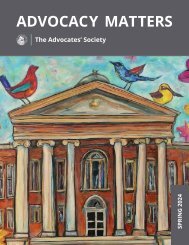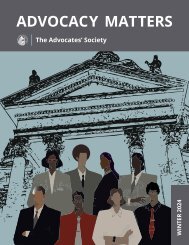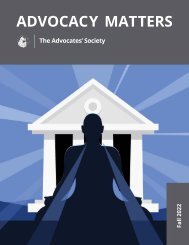Keeping-Tabs-Winter-2023
Stay up-to-date on news and events from our Young Advocates' Standing Committee (YASC) with Keeping Tabs.
Stay up-to-date on news and events from our Young Advocates' Standing Committee (YASC) with Keeping Tabs.
Create successful ePaper yourself
Turn your PDF publications into a flip-book with our unique Google optimized e-Paper software.
TRIAL ADVOCACY<br />
Trial Advocacy for Junior<br />
Litigators<br />
Flora Yu, Waddell Phillips<br />
Despite being in my first year of call, I have<br />
had the opportunity to act as second chair in<br />
three major civil trials. Trials are a “final exam”<br />
of sorts, testing nearly every major lesson in<br />
advocacy learned in law school and our day-today<br />
practice as litigators. In this article I would<br />
like to share some of the insights I have gained<br />
through trial and error (mind the pun) on how<br />
to support your team through this gruelling<br />
process, and come out as a better litigator.<br />
Plan, but not too far in advance<br />
Time is a precious commodity in civil trials. Planning<br />
in advance helps ease the pressure, but trials<br />
are unpredictable: preparing too much and<br />
too far in advance may result in otherwise excellent<br />
work becoming obsolete and the client<br />
being billed unnecessarily. This is why it is important<br />
to work backwards from a big-picture<br />
timeline with direction from senior lawyers who<br />
can fill you in on the overall trial strategy, the<br />
core arguments on which to focus your efforts,<br />
and the areas that will most likely be subject to<br />
significant change.<br />
With that guidance from senior counsel, you<br />
should prepare an outline of closing submissions<br />
in advance. A helpful outline should contain<br />
the legal arguments and excerpts of the<br />
documentary evidence on which you are most<br />
likely to rely, with clearly demarcated spaces<br />
where you require more research or evidentiary<br />
support. It is important to identify gaps in<br />
your case early and communicate them to senior<br />
lawyers, as these gaps may impact their<br />
strategy at trial.<br />
You should also brush up on key evidentiary<br />
issues that may come up at trial including<br />
hearsay, other anticipated objections (and responses<br />
to anticipated objections), impeaching<br />
witnesses, expert qualifications, and business<br />
records. Investing in the latest edition of Sopinka’s<br />
Law of Evidence in Canada (or other similar<br />
resource) will yield guaranteed returns at trial.<br />
6 7

















